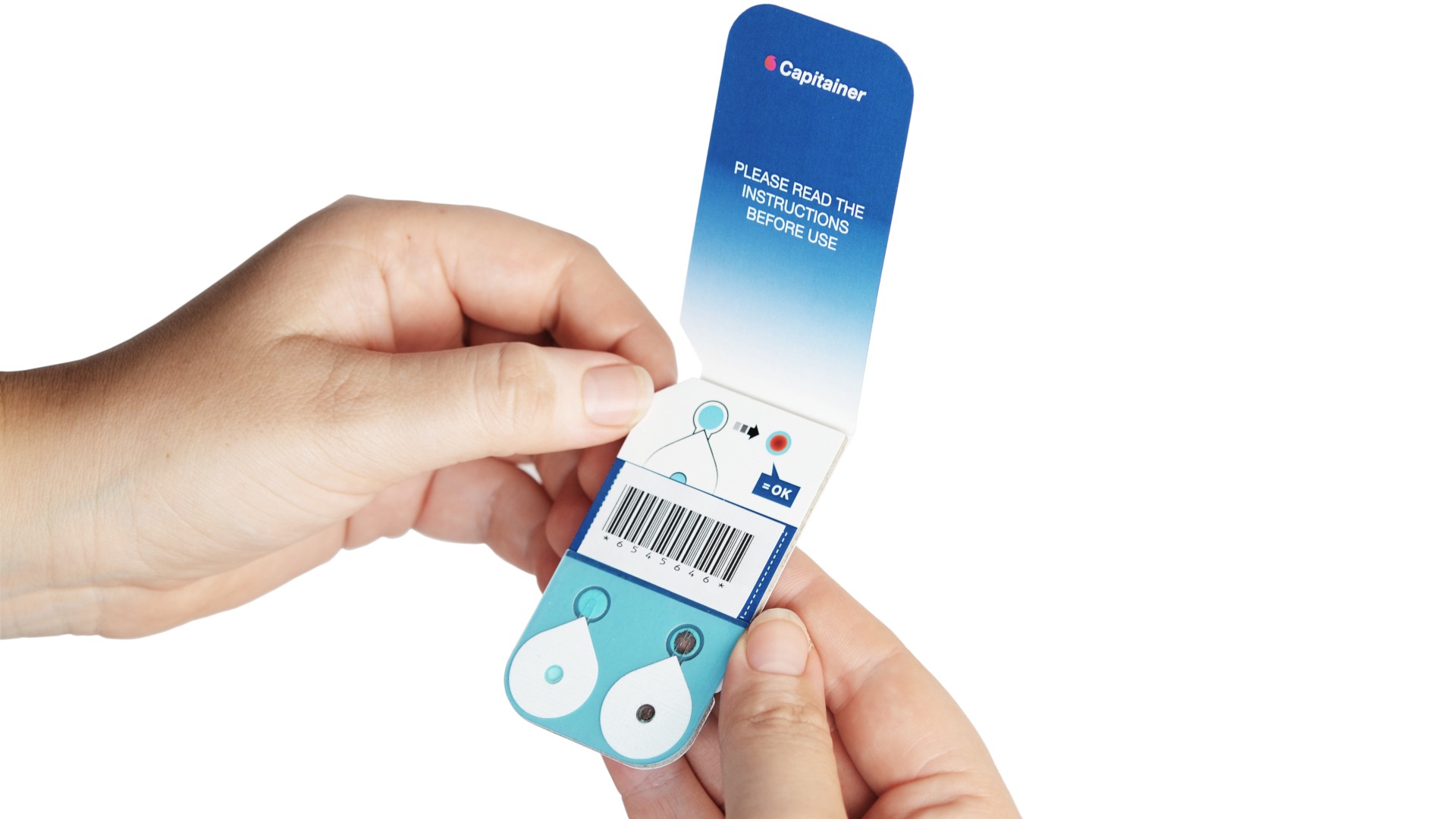Industry case: Quantitative mass testing from blood possible in the near future
By using a combination of paper and polymer microfluidics, Capitainer has made it possible for everyone to obtain a precise volume of blood from a finger prick home sample. This means that the sample can be used for accurate quantitative analysis, something that opens up for almost endless possibilities.
The idea of creating a quantitative collection device for blood and plasma started as a collaboration between Professor Olof Beck (Karolinska Institutet), Göran Stemme (KTH) and Niclas Roxhed (KTH). As a result, the company Capitainer was started in 2016, and since then, the main focus has been on developing quantitative microfluidic dried blood sample devices for home use, known as the Capitainer®qDBS.
Due to the high volumetric accuracy and precision of the device, the sample collection is on par with industrial pipetting, and will be just as reliable as venipuncture, routinely used in the health care system. The dried samples, which can survive for up to a year in room temperature, can then be sent for various laboratory analyses.
Because of its quantitative properties and extreme ease of use, Capitainer®qDBS can successfully be used for home sampling in large populations. Monitoring could include applications as viral infections and hormone levels, or biomarkers such as, PSA (prostate cancer) or NT-proBNP (cardiovascular diseases). Due to the stability of the dried blood samples, the technology is also suitable for testing in developing countries where samples can be sent to a laboratory that might only exist in far distansce, perhaps even in other countries.
Another group that could benefit greatly from the technology is immune compromised individuals, such as transplant patients. These patients can reliably be monitored from their own homes, thus avoiding pathogen exposure by going to the hospital for testing and improving the quality of life by the convenience of at home sampling.
How did SciLifeLab get involved?
Back in 2021, SciLifeLab researcher Jochen Schwenk and his team, published an article demonstrating that dried blood samples from the Capitainer®qDBS device could be just as exact as existing plasma sampling used in the hospital for monitoring SARS-CoV-2 infection. The study demonstrated the potential of the technology, and many became interested in collaborations. For example, the Public Health Agency of Sweden (FHS) has used the qDBS technology in three big covid-19 monitoring studies.
Christopher Aulin, the CEO of Capitainer explains ”For Capitainer to work with SciLifeLab, immediately puts our product in the heart of proteomics and personalized medicine. SciLifeLab can test and prove the full power of what our technology can bring to the world. When talking to the marketing director of a US multiplex analyzing instrument, they confirmed that one of the best partners Capitainer could have in the world for Proteomics are SciLifeLab, located within 2km from our office. Together with SciLifeLab, we can now support large scale studies for the pharma industry and clinical trials”.
What does SciLifeLab do?
SciLifeLab cutting-edge technology and expertise will play an important role in further development of the device for proteomic profiling but also exploring the possibilities of quantifying other molecules. Claudia Fredolini, Head of the SciLifeLab Affinity Proteomics Unit, and her colleagues have supported testing and further development of the qDBS device in the past couple of years, contributing to the evaluation of analysis robustness, stability over shipment and developing workflows to facilitate large-scale testing using qDBS sampling.
Another important role that the Affinity Proteomics Unit at SciLifeLab is playing, is to provide links to clinical researchers and the healthcare sector. Cross sector collaborations and communication are vital for taking the next step and to make the healthcare system implement Capitainer home sampling for analysis.
“Our vision is to make workflows of analysis based on qDBS, an open resource for researchers and to create a facility with capacity for population based monitoring programs”, says Claudia Fredolini.
What about the future?
There are many scenarios where the Capitainer®qDBS-device could fill an important role. Especially during pandemics or screening for disease biomarkers in large populations. According to Claudia, these screenings could also be used to discover new biomarkers for disease by population based studies.
The technology might also be vital in monitoring the health status of already sick individuals that naturally will not visit health clinics due to their conditions.
The analytical possibilities with Capitainer®qDBS will continue to improve during the coming years and the goal is to develop a fully automated pipeline from sampling to analysis. In the future, the device will also be available for urine sampling.
Want to learn more?
Visit the SciLifeLab Affinity Proteomics Unit
Visit the Capitainer webpage

Head of SciLifeLab Affinity Proteomics Unit
claudia.fredolini@scilifelab.se

CEO of Capitainer
aulin@capitainer.se





